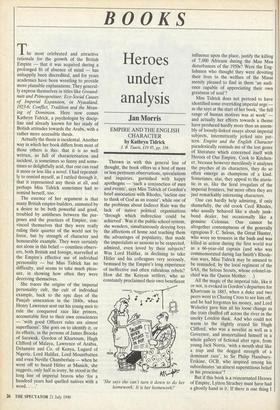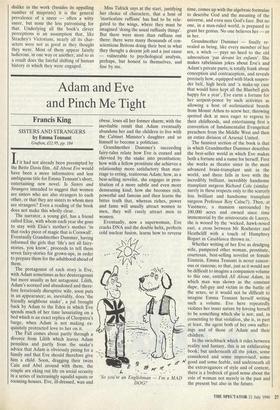BOOKS
Heroes under analysis
Jan Morris
EMPIRE AND THE ENGLISH CHARACTER by Kathryn Tidrick I. B. Tauris, £19.95, pp. 338 The most celebrated and attractive rationale for the growth of the British Empire — that it was acquired during a prolonged fit of absence of mind — has unhappily been discredited, and for years academics have been wrestling to provide more plausible explanations. They general- ly express themselves in titles like Ground- nuts and Primogeniture: Eco-Social Causes of Imperial Expansion, or Nyasaland, 1923-6: Conflict, Tradition and the Mean- ing of Dominion. Here now comes Kathryn Tidrick, a psychologist by discip- line and already known for her study of British attitudes towards the Arabs, with a rather more accessible thesis.
Actually the thesis is incidental. Another way in which her book differs from most of those others is this: that it is so well written, so full of characterisation and incident, is sometimes so funny and some- times so delightfully acid, that one can read it more or less like a novel. I had repeated- ly to remind myself, as I rattled through it, that it represented any thesis at all, and perhaps Miss Tidrick sometimes had to remind herself, too.
The essence of her argument is that many British empire-builders, animated by a desire to be both powerful and good, troubled by antitheses between the pur- poses and the practices of Empire, con- vinced themselves that they were really ruling their quarter of the world not by force, but by strength of character and honourable example. They were certainly not alone in this belief — countless observ- ers, both British and foreign, marvelled at the Empire's effective use of individual personality — but Miss Tidrick has no difficulty, and seems to take much pleas- ure, in showing how often they were deceiving themselves.
She traces the origins of the imperial personality cult, the cult of individual example, back to the epic days of the Punjab annexation in the 1840s, when Henry Lawrence sent out his young men to rule the conquered race like princes, accountable first to their own consciences — 'with good Officers rules are almost superfluous'. She goes on to identify it, or its effects, in the persons of James Brooke of Sarawak, Gordon of Khartoum, Hugh Clifford of Malaya, Lawrence of Arabia, Delamere and Co. of Kenya, Lugard of Nigeria, Lord Halifax, Lord Mountbatten and even Neville Chamberlain — when he went off to beard Hitler at Munich, she suggests, only half in irony, he stood in the long line of imperial bravos who 'for a hundred years had quelled natives with a word. . . .' Thrown in with this general line of thought, the book offers us a host of more or less pertinent observations, speculations and inquiries, garnished with happy apothegms — 'such a conjunction of men and events', says Miss Tidrick of Gordon's brief association with Rhodes, 'incline one to think of God as an ironist', while one of the problems about Indirect Rule was the lack of native political organisations 'through which indirection could be achieved'. Was it the public school system, she wonders, simultaneously denying boys the affections of home and teaching them the advantages of popularity, that made the imperialists so anxious to be respected, admired, even loved by their subjects? Was Lord Halifax, in declining to take Hitler and his colleagues very seriously, bemused by the Empire's long experience of ineffective and often ridiculous rebels? How did the Kenyan settlers, who so constantly proclaimed their own beneficent 'She says she can't turn it down to do her homework. It is her homework!' influence upon the place, justify the killing of 7,000 Africans during the Mau Mau disturbances of the 1950s? Were the Eng- lishmen who thought they were devoting their lives to the welfare of the Masai merely pleased to find in them 'an audi- ence capable of appreciating their own greatness of soul'?
Miss Tidrick does not pretend to have identified some overriding imperial urge as she says at the start of her book, 'the full range of human motives was at work' and actually her efforts towards a theme have produced hardly more than an assem- bly of loosely-linked essays about imperial subjects, intermittently jerked into pat- tern. Empire and the English Character paradoxically reminds me of the lost genre of literature which concerned itself with Heroes of Our Empire, Cook to Kitchen- er, because however mercilessly it analyses the psyches of its characters, they do so often emerge as champions of a kind. Sometimes, alas, they appeal to the atavis- tic in us, like the feral irregulars of the imperial frontiers, but more often they are just remarkably interesting characters.
One can hardly help admiring, if only shamefully, the old crook Cecil Rhodes, who usually behaved like a shady junk- bond dealer, but occasionally like a genuine Colossus. One cannot be altogether contemptuous of the generally egregious F. C. Selous, the Great Hunter, who wore no trousers in the bush and was killed in action during the first world war as a 66-year-old captain (and who was commemorated during Ian Smith's Rhode- sian wars, Miss Tidrick may be amused to be reminded, by the local regiment of the SAS, the Selous Scouts, whose colonel-in- chief was the Queen Mother. . .) All the magic of the imperial tale, like it or not, is evoked in Gordon's departure for Khartoum in 1883, when a duke and two peers went to Charing Cross to see him off, and he had forgotten his money, and Lord Wolseley gave him all his loose change as the train chuffed off across the river in the smoky London dusk. And who could not warm to the slightly crazed Sir Hugh Clifford, who was a novelist as well as a Governor, and immortalised himself in a whole gallery of fictional alter egos, from young Jack Norris, 'with a mouth shut like a trap and the dogged strength of a dominant race', to Sir Philip Hansbury- Erskine, GCB, who inspired among his subordinates 'an almost superstitious belief in his prescience'?
But if this book is a reincarnated Heroes of Empire, Lytton Strachey must have had a ghostly hand in it. If there is one thing I dislike in the work (besides its appalling number of misprints) it is the general prevalence of a sneer — often a witty sneer, but none the less patronising for that. Underlying all the book's clever perceptions is an assumption that, like Strachey's Victorians, nearly all its char- acters were not as good as they thought they were. Most of them appear faintly ludicrous, in one way or another, and so as a result does the fateful shifting of human history in which they were engaged. Miss Tidrick says at the start, justifying her choice of characters, that a host of `inarticulate ruffians' has had to be rele- gated to the wings, where they must be imagined 'doing the usual ruffianly things'. But there were more than ruffians out there: there were many thousands of con- scientious Britons doing their best in what they thought a decent job and a just cause — vulnerable to psychological analysis, perhaps, but honest to themselves, and fine by me.



















































 Previous page
Previous page